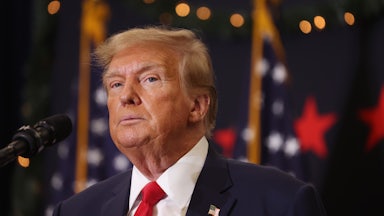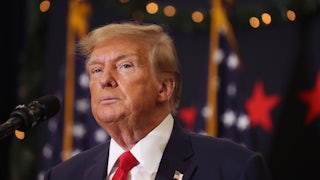When Americans cast their ballots up to Election Day next week, they’ll be voting for a president and a vice president. In a much more real sense, they’re also voting for thousands of people who will staff the rest of the executive branch.
The federal government currently employs at least two million civilians. Supervising them are roughly 4,000 presidential appointees, according to the Center for Presidential Transition. Just over 1,200 of those appointees, such as Cabinet secretaries and agency heads, require Senate confirmation. The rest require nothing more than a sign-off from the Oval Office.
These appointees serve as the nervous system of any presidential administration, transmitting the policy goals of the White House to every corner of the federal government. After all, a president cannot do everything. Joe Biden does not personally deliver the mail, or issue hurricane warnings, or tell national park visitors to avoid feeding wildlife. The federal civil service does that.
Americans got a visceral taste of what a second Trump administration might look like on Sunday night, when Trump held a high-profile rally at Madison Square Garden in New York City. The event featured prominent guests like Hulk Hogan and Dr. Phil, as well as a rare appearance by former first lady Melania Trump. But it was the lower-billed speakers who seemed to seek, and subsequently received, the most attention.
Tony Hinchcliffe, who against all odds identifies as a comedian, delivered a litany of racist invective as part of a stand-up routine. He described Puerto Rico as a “floating island of garbage” and disparaged Latinos more broadly. “These Latinos, they love making babies too,” he told the audience. “Just know that. They do, they do. There’s no pulling out. They don’t do that. They come inside, just like they did to our country.”
Hinchcliffe also suggested in one bit that Israel and Palestine could settle their differences with a game of rock paper scissors. “You know Palestinians will throw rock every time, and also we know Jews have a hard time throwing that paper,” he said, referencing antisemitic tropes about Jewish people and money. In another quip, he claimed that Black Americans would be “carving watermelons” instead of pumpkins for Halloween.
Other guests also leaned into racist comments and tropes. Grant Cardone, an influencer and corporate speaker, said that Harris “and her pimp handlers will destroy the country.” Tucker Carlson, an ex-Fox News host, mocked Harris in racist terms while claiming that Democrats would have a hard time stealing the election because of her.
“It’s gonna be pretty hard [for them] to look at us and say, ‘You know what? Kamala Harris, she got 85 million votes because she’s just so impressive. As the first Samoan-Malaysian low-IQ former California prosecutor ever to be elected president. It was just a groundswell of popular support,’” he sarcastically told the crowd. Harris’s mother is a biomedical scientist who immigrated to the United States from India; her father is a Stanford University economics professor who originally hails from Jamaica.
But it was Hinchcliffe’s remarks on Puerto Rico that drew the most scrutiny from the public—and panic from Republicans. Florida Senator Rick Scott—whose state is home to thousands of Puerto Rican voters—quickly denounced the “garbage” comment. “It’s not funny and it’s not true,” he said on Twitter. “Puerto Ricans are amazing people and amazing Americans!” Maria Elvira Salazar, who represents Florida’s 27th congressional district, said on Twitter that the rhetoric “does not reflect GOP values.”
Even the Trump campaign rebuked the remark via a statement that said Hinchcliffe’s comment “does not reflect the views of President Trump or the campaign.” That is somewhat hard to believe. In 2019, Trump referred to Puerto Rico as if it were not part of the United States. A former Trump administration staffer later said that Trump had told him after a hurricane that the island should be traded for Greenland because Puerto Rico was “dirty” and the people are “poor.”
Top Trump adviser Stephen Miller, the architect of Trump’s immigration policies and proposed mass-deportation plans, declared that “America is for Americans and Americans only.” Trump himself also struck a fascist tone while denouncing Democrats. “They’re smart and they’re vicious, and we have to defeat them,” he told supporters. “And when I say, ‘the enemy from within,’ the other side goes crazy. Becomes a sound– ‘Oh, how can he say’—no, they’ve done very bad things to this country. They are indeed the enemy from within.”
I doubt that Hinchcliffe or any of the other speakers will literally be appointees in a future Trump administration. As I’ve noted before, however, they represent the spirit that Trump’s once and future henchmen hope to bring to Washington. They represent the zeitgeist that Trump and his allies hope to bring to the federal government if he prevails over Harris: crass and crude, authoritarian in style and substance, unabashedly racist and xenophobic. Sunday’s rally was Trumpism prematurely confident of victory and unafraid of revealing itself. As Carlson said, referring to those in attendance and onstage, Trump had “liberated us, in the deepest and truest sense.”
Trumpworld already has ambitious plans for running the federal government. Russ Vought, a former director of the White House Office of Management and Budget during the Trump administration, now works for the Center for Renewing America, a Trump-aligned think tank staffed with sympathetic policy officials. According to private speeches reviewed by ProPublica, he has touted his group’s plans to rapidly reshape the federal government if Trump wins a second term to stop what he describes as a war against a “Marxist takeover” of America.
“We have detailed agency plans,” Vought reportedly said in a speech earlier this year. “We are writing the actual executive orders. We are writing the actual regulations now, and we are sorting out the legal authorities for all of what President Trump is running on.”
Vought’s comments are reminiscent of the Heritage Foundation’s Project 2025 agenda, to which he was a contributor. He emphasized the need for the president and his close allies to seize total control of the executive branch. “The President must set and enforce a plan for the executive branch,” Vought wrote in the project’s manifesto. “Sadly, however, a President today assumes office to find a sprawling federal bureaucracy that all too often is carrying out its own policy plans and preferences—or, worse yet, the policy plans and preferences of a radical, supposedly ‘woke’ faction of the country.”
Among Vought’s hopes for a second term, according to ProPublica, is a war on federal civil servants, whom he wants to purge in favor of ideologically sympathetic appointees. “We want the bureaucrats to be traumatically affected,” he said. “When they wake up in the morning, we want them to not want to go to work because they are increasingly viewed as the villains. We want their funding to be shut down so that the EPA can’t do all of the rules against our energy industry because they have no bandwidth financially to do so. We want to put them in trauma.”
Those who aren’t “traumatically afflicted” might be summarily dismissed instead. In 2020, Trump issued a last-minute executive order that would have made it theoretically possible to fire thousands of federal civil servants by reassigning them to a category known as Schedule F, bypassing the civil service protections in federal law that would otherwise protect them. The executive order was never carried out before Trump left office, and President Joe Biden repealed it shortly after he was sworn in, but Trump loyalists have salivated about the prospect of reviving it should Trump win in November.
Even then, staffing a second Trump administration with MAGA loyalists would require overcoming traditional obstacles. One of them is the security-clearance process that many federal employees, particularly those who work on national security matters, are subjected to when taking federal jobs. The New York Times reported last week that Boris Epshteyn, a prominent Trump legal adviser, is among the aides circulating a memo that called for Trump to bypass the background-check process and immediately grant security clearances to thousands of his appointees.
Among the beneficiaries of that plan would be Epshteyn himself, who was indicted for his role in Arizona’s fake-electors scheme after the 2020 election. A criminal history typically makes it much harder to pass the standard FBI background check that vets presidential appointees. As president, Trump himself intervened in the process to clear Jared Kushner, his son-in-law, in 2017—despite Kushner’s alleged conflicts of interest. Epshteyn’s plan would apply that approach writ large to countless officials who might otherwise not be suitable for a government post.
Why are Trumpworld’s representatives being so blunt and forceful? A conscious goal in Trumpian circles is to avoid what they saw as the mistakes of his first term. That means an emphasis on personal loyalty over loyalty to the Constitution or the country. During his stint in office, Trump found his most extreme ideas and plans blunted, watered down, or delayed by various Republican officials who feared the damage they could do. The goal this time is to ensure that everyone in a position to hinder Trump is there to help him.
Perhaps the starkest example of this dynamic came from John Kelly, a former general who served as secretary of homeland security and as Trump’s chief of staff during his administration. Kelly told The New York Times in recent weeks that the former president had “met the definition of a fascist, would govern like a dictator if allowed, and had no understanding of the Constitution or the concept of rule of law.
“Certainly the former president is in the far-right area, he’s certainly an authoritarian, admires people who are dictators—he has said that,” Kelly told the newspaper. “So he certainly falls into the general definition of fascist, for sure.” He added that Trump “certainly prefers the dictator approach to government” and believed he should be able to do whatever he wanted, whenever he wanted to do it.
None of this is particularly surprising to anyone who followed the Trump administration last time or paid attention to how he spoke about a possible second term thereafter. What stands out is that Trump’s goal isn’t just to try again, but to ensure that there will be no John Kellys to stop him. The Madison Square Garden rally showed how much of Trumpism is about satisfying the basest, crudest, and most hateful impulses in American life—and how much his acolytes can’t wait to wield the federal government to do it.










